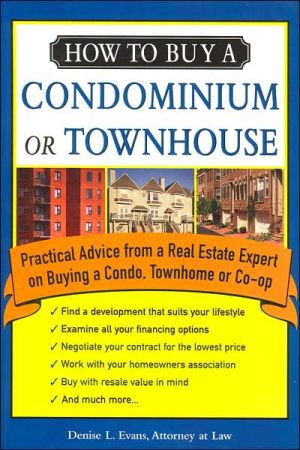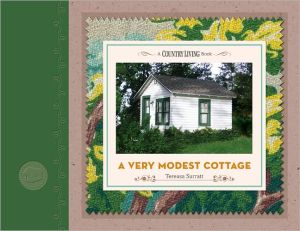How to Buy a Condominium or Townhouse: Practical Advice from a Real Estate Expert on Buying a Condo, Townhome or Co-op
Whether you are just starting out, looking to own with all the extras or transitioning to simpler living conditions, How to Buy a Condominium or Townhouse explains how to find the best condo, townhouse or co-op for you.\ - Find the biggest space with the most amenities\ - Finance your purchase-even with less than perfect credit\ - Find a real estate agent who will work just for you\ - Negotiate your sales contract to get the lowest price\ - Participate in your homeowners association\ Plus,...
Search in google:
This new addition to our real estate line of products expands on the differences between a single-family home, a condominium and a townhome in regards to ownership. The process of the contract, pre-closing issues and closing concerns are reviewed in a step-by-step fashion.
Should You Buy a Condo? Decide if condominium-living is right for you before you sign the papers.\ Excerpted from How to Buy a Condominium or Townhouse by Denise Evans ©2006\ Almost this entire chapter applies equally to condo, townhome, or cooperative apartment living. To make things easier on you, all of these things are referred to by their generic name common interest developments (CIDs). If something in this chapter differs for each type of CID, it will be mentioned specifically.\ Living in a CID offers virtually all the benefits of traditional home ownership. Mortgage interest is deductible, including the interest on a loan used to purchase stock in a cooperative apartment. Property taxes are deductible, including your pro rata share of the property taxes paid by a co-op building. Unit value usually appreciates over time. However, life in a CID also contains some of the same drawbacks as detached housing, such as large closing costs and market risks, and often regular maintenance expenses.\ Common interest developments offer two extremely important advantages over typical stand-alone homes. First, they give you the ability to live in areas of extremely high real estate prices, where the price of the land alone would make residency impossible for most people. Second, they provide you with the privilege of enjoying amenities formerly reserved only for the very wealthy-full-time security, Olympicsize swimming pools, property management, perhaps even stables and riding rings, boat slips, private airfields, on-site day care, and many other benefits that would otherwise not be available to you.\ Before going further, you should evaluate how much individuality you are willing to give up to gain the benefits you want. As a general rule, co-ops are the most restrictive, then condos, and townhomes last. There are variations of restrictiveness within each group, however. Decide early on the importance of the following issues to you, and then shop for something that fits your personality, not just your financial or other types of needs.\ Are You Willing To Share?\ Sharing expenses in order to get more expensive things also means you have to share the things. Problems come with all the little things you never thought you would have to share. For example, you might not have a particular parking place that is specifically designated for you. Someone might become irate if you hog your share of the dumpster by tossing in some old mattresses. Finally, think about possibly sharing bandwidth for your computer, hot water for your shower, or loading dock time for your movers. Are you okay with sharing these things?\ Some things cannot be shared in a CID. There might be rules against burning incense because the other owners do not want to share your fragrances. Likewise, they might be opposed to the lovely melodies coming from your wind chime collection. You could be stunned to discover that the lighted Santa Claus who always sits in your living room window during the holidays is not welcome. Not only must you share many things, but you also must refrain from sharing many other things.\ Can You Give Up a Little Control?\ When living in a CID, owners have less control over their environment than with stand-alone dwellings. Your ability to modify your unit will usually be limited. Rules designed to prevent abuses by other people-self-centered maniacs bent on mayhem and destruction-might actually keep you from having a perfectly civilized, late-night party at the pool with fifty of your closest friends.\ However, it is hard work making all the decisions that come with home ownership, and sometimes it is nice to have major decisions made for you by these rules. Isn't it okay if someone else picks out the carpet pattern in the hallways-even if it is a color you detest-as long as someone else also vacuums it every day? How terrible would it be to buy a condominium or townhouse it be if you could not paint your front door a beautiful shade of red, but your next door neighbor also could not paint his or her door some ghastly color like mauve?\ By and large, members of a condominium association have the same interests as you. They want to share amenities on a reasonable basis, preserve property values, decrease the amount of time wasted on maintenance issues, and balance privacy concerns with the very human desire to build vibrant and interactive communities. Because people have widely different views about what is necessary to accomplish those goals, there have to be multiple rules rather than one golden rule. That is the heart of CID living.\ Are you Willing to Participate?\ In order to receive the full benefits of community ownership, you must be willing to take part in CID government. Folks who do not attend meetings or read the monthly newsletter will probably have unpleasant surprises ahead for them, because people who are vocal and who regularly review issues and vote on them will have the most influence on rules, regulations, and enforcement policies. Your ability to live happily and productively, with a minimum of objectionable restrictions, will depend on your input into the process.\ Test: Is a Condo Right for Me?\ To determine if condo living is right for you, try this quick test.\ 1. My privacy is:\ ___ Not important to me.\ ___ Somewhat important to me.\ ___ So important I used to be a hermit.\ 2. My need to be in control of my living environment can best be described as:\ ___ NOT a control freak.\ ___ Need to be in control, at least to some degree.\ ___ As a matter of fact, someone DID die and make me king.\ 3. Amenities such as swimming pools and tennis courts are:\ ___ Very important to me.\ ___ Not that important to me.\ ___ I'm not the athletic type.\ 4. I would respond to the following statement, "I like mowing the lawn, landscaping, and gardening," with:\ ___ Are you kidding?\ ___ I don't mind it.\ ___ I love working outdoors.\ 5. The following describes my position on doing my annual maintenance chores exactly on time:\ ___ I thought gutters flushed themselves out.\ ___ I am on top of it, give or take six months.\ ___ I have a laminated schedule taped on the refrigerator.\ 6. Home resale value is important to me:\ ___ Because I may be moving within the next three years.\ ___ But I expect to be here for a while.\ ___ Even though I plan to live here forever.\ 7. Living in an urban environment is:\ ___ Vibrant, exciting, and convenient.\ ___ Something I can either take or leave.\ ___ Not for me-give me the country life.\ 8. Meeting and interacting with many different types of people is:\ ___ Very important to me.\ ___ Relatively important.\ ___ I hate people.\ Total all your points, giving yourself 1 point for each first answer, 2 points for each second answer, and 3 points for each third answer.\ Evaluate your scores as follows:\ 8 to 10 points: Future president of condominium association\ 11 to 20 points: A good candidate for CID life\ 21 to 24 points: Thanks for buying the book anyway\ Do not get discouraged if you scored in the 21 to 24 range but truly want to enjoy beachfront property part of the year, a retirement community that can adapt to your changing needs over time, or any of the other specialized CID opportunities.\ Real estate developers understand market forces. They know that not everyone is a perfect CID candidate, but they still like to attract as many buyers as possible. If you shop carefully and do your research, you can find a community that is right for you.
IntroductionTop 20 Questions of First-Time Condo or Townhouse BuyersChapter 1: The Difference Between Condos and HousesCondominiumsTownhomesMajor Differences Between Condos and TownhomesCo-op ApartmentsMajor Differences Between Co-ops and CondosFinancial Comparison of Condo, Co-op, Townhome, and ApartmentPlanned Unit DevelopmentsCommon Interest DevelopmentsChapter 2: Different Types of Condo DevelopmentsVacation CondosKiddie CondosGame Day CondosKosher CondosLeasehold Condos, Co-ops, and TownhomesCondotelsLimited Equity Condominiums and Co-opsA Style for EveryoneChapter 3: The Condo LifestyleAre You Willing to Share?Can You Give Up a Little Control?Are You Willing to Participate?Test: Is a Condo Right for Me?Chapter 4: Legal OverviewSpecialized LawWho Owns What?Who Owns What in a Condo, Townhome, or Co-op Development?Who is Responsible for What?How Much Independence Do You Have?Owners’ Constitutional RightsTypical Condominium RulesTypical Townhome and Co-op RulesWhat if the Condo Developer has Financial Problems?What if a Co-op Board has Financial Trouble?Chapter 5: Social and Political ConsiderationsCondo GovernmentThe Homeowners AssociationThe Cooperative BoardNoisePrivacyDevelopments with Residents of Similar InterestsChapter 6: Deciding What You Can AffordWorking Up a Housing BudgetCalculating the Monthly Housing Expense You Can AffordPreapproved Loan AmountsDues and Assessments in Condos and TownhomesCo-op Rent and MaintenanceConverting Housing Budgetto Purchase PricePurchase Price Worksheet (with Examples)Monthly Loan Constants for a Thirty-Year Mortgage LoanMortgage Interest Tax DeductionCalculate Home Mortgage Tax Deduction SavingsSpecial Considerations for Co-opsVacation Rental IncomeOverall Financial AnalysisChapter 7: Financing OptionsOverview of Mortgage LendingShop for Financing EarlyKnow Your Credit ScoreImproving Your Credit ScoreLess than Perfect CreditComparison of Loan Interest Rates and TermsPointsCommon Lender TrapsPrepayment PenaltiesFully Amortizing LoansBalloon LoansAdjustable-Rate Mortgages (ARMs)Interest-Only LoansGrowing Equity Mortgages No-Document LoansThe Right Loan Arrangement for YouChapter 8: Different Types of LendersTraditional Sources of Residential MortgagesSpecialized Co-op LendersVA Guaranteed LoansFHA Insured LoansUSDA LoansHUD Loan Guarantees for Native AmericansFannie Mae, Ginnie Mae, and Freddie MacMortgages from Stock Brokerage HousesAssumable LoansUsing Retirement MoneyCreative Financing SourcesA Dangerous Lending AlternativeLoan Comparison Loan Comparison WorksheetChapter 9: Deciding on Home Features You WantLocation ConsiderationsLength of OwnershipUse of the HomeYour Particular Unit FeaturesThe DevelopmentArea AmenitiesUtilities and TechnologyDevelop a ChecklistHome Features ChecklistComparing PropertiesChapter 10: Real Estate Brokers and AgentsReal Estate ProfessionalsHow Agents Are PaidSellers’ AgentsBuyers’ AgentsTransaction BrokersLimited Consensual Dual AgencyWho Does the Agent Work For?Determining the Type of Broker that is Right for YouFinding a Broker with Condo and Townhome ExperienceSpecial Considerations for Co-opsChapter 11: Finding Properties on Your OwnProperties You Won’t Hear About From an AgentWorking without an AgentHow to Find PropertiesSpecial Considerations for Co-opsReal Estate Agent EtiquetteSources of Information about Recent SalesChapter 12: Asking the Right Questions as You ShopGetting Information from the Listing AgentTalking Directly to SellersTen Questions to Ask Sellers about the UnitSpecial Questions for Mature ProjectsSpecial Questions for New ProjectsCo-op and Condo ConversionsNine Questions about FinancesMeeting the NeighborsHealth and Safety IssuesCurb AppealChapter 13: How to Negotiate SuccessfullyBasic Negotiation TacticsPrice vs. TermsConcentrating on Deal PointsUnderstanding Offers and CounteroffersNegotiating Directly with a SellerNegotiating through an AgentNegotiating with the Developer of a New ProjectDocumenting Verbal NegotiationsChapter 14: Writing a ContractEarnest MoneyHow to Personalize Real Estate FormsImportant Clauses You Want in Your ContractContingenciesObjectionable ClausesMiscellaneous Other MattersChapter 15: Important Contingency ClausesContingencies that Favor BuyersCommon All-Purpose Back DoorsContingencies the Developer WantsClauses the Seller WantsChapter 16: Preparing for ClosingAssistance from the Real Estate AgentChoose a Closing AgentSelect a Title Insurance CompanyDeliver Information to the Closing AgentFinalize Loan DetailsRead the Closing ChecklistOrder InspectionsObtain Important LettersReview DocumentsSecure Proof of Association or Co-op Building InsuranceOrder Homeowners InsuranceAssist the Appraisal ProcessCheck with Local GovernmentsContact UtilitiesChapter 17: The ClosingClosing ProceduresThe Settlement StatementOther Closing Documents and ProceduresDeductible Closing ExpensesTax Deductions for Home Purchase ExpensesChapter 18: Ownership ResponsibilitiesParticipate in GovernanceManage the Management CompanyUnderstand Your Community PersonalityVote Intelligently on Dues and AssessmentsAvoiding ProblemsProper Management of Rental UnitsMiscellaneous ConsiderationsChapter 19: Thinking Ahead to a Sale of Your CondoBuy What You Can AffordBuy Smart to Sell SmartKnow the NeighborsStay Informed about Your MarketDeciding Whether to RemodelRecouping Your Investment and Closing CostsCalculating Profit on the Sale of a Condo, Townhome, or Co-opHow Long Must You Own Your Condo Before You Can Make a Profit on Sale?Investing in Rental PropertiesEstate Planning IssuesFlippingOvercoming Analysis ParalysisGlossaryAppendix: WebsitesIndexAbout the Author








